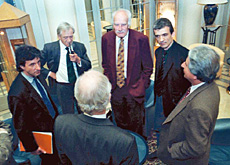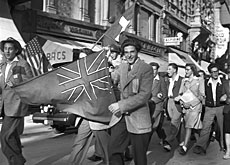Bergier saddened by lack of political feedback

Five years after the publication of his report on Switzerland during the Second World War, Jean-François Bergier says he is disappointed by the lack of reaction.
Bergier, president of the Independent Commission of Experts (ICE) which prepared the text, told swissinfo that it seemed that politicians had lost interest and avoided public debate on the findings.
The ICE, which included Swiss and foreign historians, was appointed by the government in December 1996 to investigate neutral Switzerland’s role in the Nazi period from a historical and legal point of view.
The decision followed immense pressure from at home and abroad that centred on Swiss ties with Germany at that time, Switzerland’s wartime refugee policy, and the money deposited in Switzerland by Nazi victims.
The Swiss historian handed in his final report, a summary of 27 volumes, on March 22, 2002.
swissinfo: It is five years since you handed in the “Bergier Report” to the Swiss authorities. What were your feelings at the time?
Jean-François Bergier: There was immense relief at having completed the difficult work on time and a feeling of collective pride for the team, which included about 100 people. At the same time, there was a feeling of incompleteness because we had to leave some problems out because they were not in our mandate.
We believed we had done honourable work. We were expecting more discussion or even unfair criticism, which was not the case apart from a few hardliners. But this remained marginal.
swissinfo: And how did you feel as a Swiss citizen?
J.-F.B.: My first disappointment was noting that our civic mission no longer interested the politicians, who had called for it in a kind of panicky enthusiasm. They lost interest or avoided the public debate that had been promised.
But interest among the public was very lively. The Swiss needed to know, especially the young. In the months that followed, there were many debates in venues that were at times bursting at the seams with people. It was impressive. And there was a travelling exhibition presenting our work which had considerable success.
swissinfo: It could not have been easy to settle down to work in such an emotional climate.
J.-F.B.: We were under pressure from start to finish, but in different ways. At the beginning, we were urged to speed up our work and there were attempts to dictate our conclusions. But in the end, the opposite happened when we were told not to advance anything that was compromising.
swissinfo: There was also pressure from abroad.
J.-F.B.: On that score the pressure dropped very quickly in 1998 after the $1.25 billion (SFr1.52 billion) settlement between Swiss banks and representatives of Jewish plaintiffs in New York.
swissinfo: Did the report manage to reconcile the Swiss with their past?
J.-F.B.: I simply hope to have made them aware of their past, of the fact that their country was not quite as spotless as some had maintained. We had to find the fair view of reality – between the rosy picture [of Switzerland] some had tried to promote during the Cold War and the criticism which arose in some circles from the 1970s.
It has to be said that the least issue surrounding the report always provoked controversy. There were plenty of opposing books, pamphlets and articles published, particularly by those who defended the rosy picture of Switzerland. Then came the publication last year of a good schoolbook which put everything into context and that aroused renewed controversy.
swissinfo: Did the report point out any institutional deficiencies which in your view still exist?
J.-F.B.: I would not speak of bitterness, but let us say that I found it a pity to see that some deficiencies we pointed out were not taken into consideration. At a time of war or crisis there can be friction between the political authorities and those who run the economy. There is also the question of the government’s powers because constitutionally they are not clear.
And above all there’s the issue of Switzerland’s historical responsibility. You have to be responsible for your past. On that condition you can face the future clearly and calmly.
swissinfo: As a historian, how do you react to the recent trial of Doğu Perinçek, the Turkish politician fined in Lausanne for his revisionist views on the Armenian genocide?
J.-F.B.: I think a historian can be mandated, like I was, to shed light on a number of problems. But he has to keep his independence. I am very concerned about any legislation that gags historians if they say something which is not politically correct, even if they can prove it.
Of course you have to avoid spreading false revisionist ideas that are insulting to the victims. But historians have to remain free so as to guarantee that their work is solid. It is up to them to make sure they remain honest. It’s a question of professional ethics.
It is always very delicate when a historian is called to give testimony in a trial. When a judge has to make a judgement on a historian, it can become dangerous.
swissinfo-interview: Isabelle Eichenberger
December 1996: The federal government appoints the Independent Commission of Experts Switzerland – Second World War (ICE). It was eventually allocated a budget of SFr22 million ($18 million).
May 1998: Presentation of the first interim report, entitled Switzerland and Gold Transactions in the Second World War.
December 1999: Publication of the second interim report – Switzerland and Refugees in the Nazi Era.
December 2001: Final report presented to the Swiss government exactly five years after the commission’s appointment.
March 2002: The final report is published. It complements 27 volumes of research now available. The ICE is dissolved and a parliamentary commission decides against holding a scheduled debate. With the title Switzerland, National Socialism and the Second World War, it was published in English by the Pendo publishing house of Zurich.
Born in 1931 in Lausanne, Jean-François Bergier was professor of economic history at Geneva from 1963 to 1969, before taking up a post at the Federal Institute of Technology (1969-1999).
From 1996 to 2001, he was president of the Independent Commission of Experts that studied the behaviour of Switzerland during the Second World War.
He received a doctorate honoris causa from St Gallen University in 1985. Bergier is also a member of the prestigious Institut de France.

In compliance with the JTI standards
More: SWI swissinfo.ch certified by the Journalism Trust Initiative











You can find an overview of ongoing debates with our journalists here . Please join us!
If you want to start a conversation about a topic raised in this article or want to report factual errors, email us at english@swissinfo.ch.